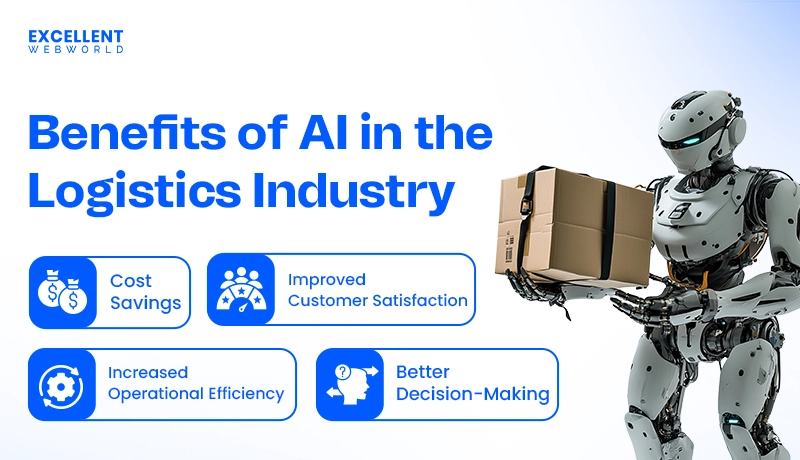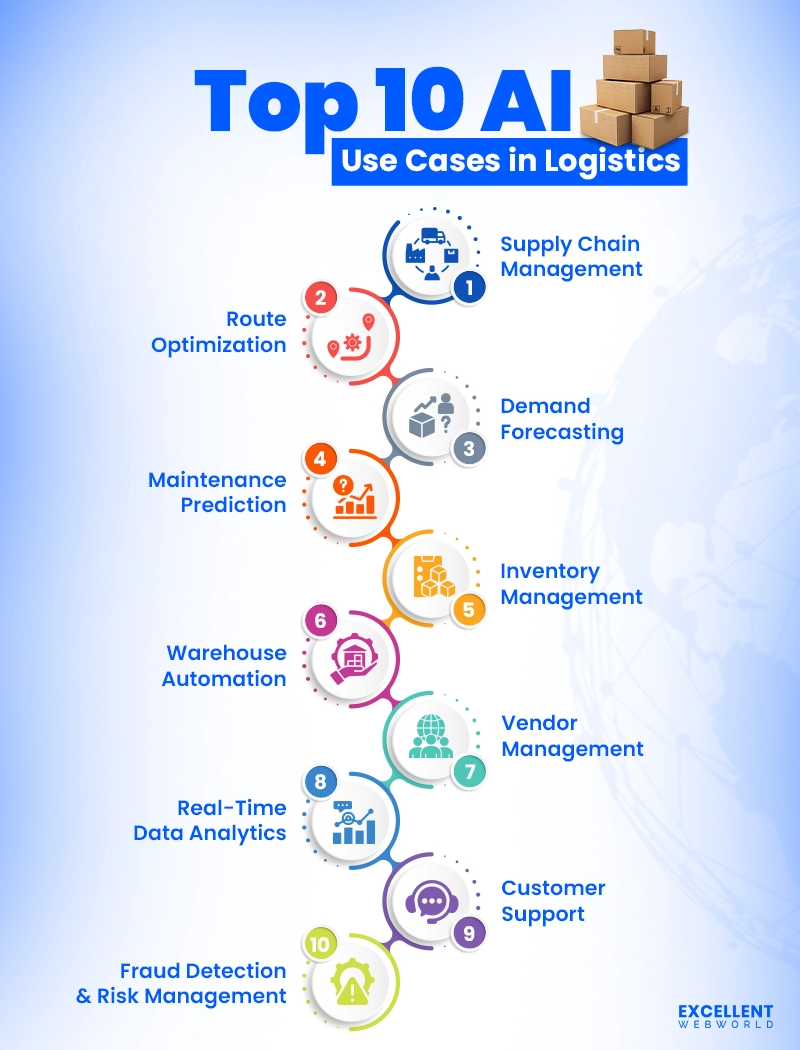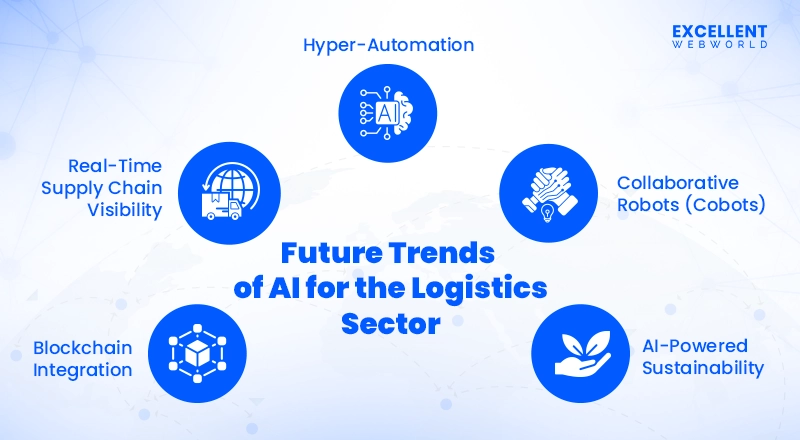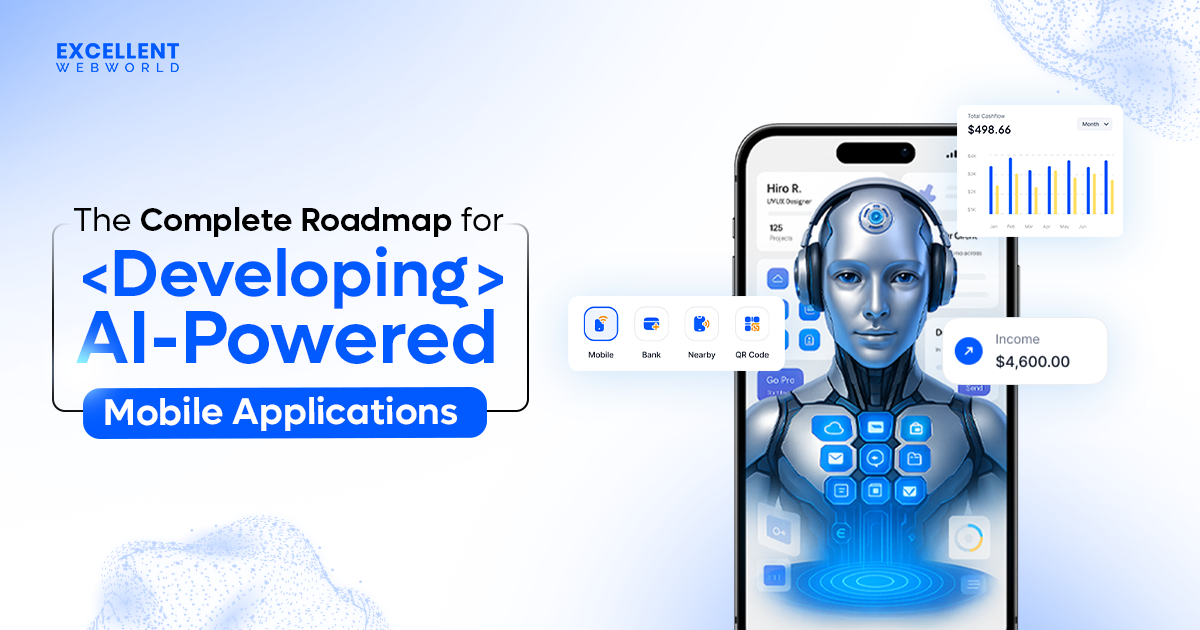Artificial Intelligence (AI) has resolved several challenges in many industries, and logistics is one of them. The logistics industry is known as the backbone of global commerce because it connects every sector. AI in logistics plays a crucial role as it not only smoothens the supply chain management, but also empowers other connected industries as well.
According to the Verified Market Research, the market size of artificial intelligence in logistics and supply chain was valued at USD 4450.64 Million in 2023 globally. The same report estimates its valuation to reach USD 65039.34 Million by 2031, growing at a CAGR of 46.50% from 2026 to 2031.

This blog aims to help you understand how AI actually improves customer satisfaction with supply chain optimization. As an entrepreneur, you will get a clear idea regarding the impact, applications, and future of AI in supply chain and logistics and learn how the use of generative AI is reshaping the logistics landscape.
Why Is AI in Logistics Important Today?
AI is revolutionizing the logistics industry by providing smart solutions for supply chain management, expanding the traditional role of artificial intelligence in overcoming logistics challenges. It is upgrading how logistics systems operate fundamentally, helping them reach a tremendous level of sophistication and precision that was previously unattainable.
The AI integration allows logistics companies to handle huge and complex supply chains with ease. By processing large amounts of real-time data, AI helps businesses identify efficiency gaps, predict possible disruptions, and implement solutions actively. After all, logistics is not just about moving goods from one place to another; it’s about developing flawless, transparent, and responsive supply chains.
AI is poised to solve many logistics challenges, including connecting fragmented supply chain networks and the impact trucking and freight have on climate change. https://t.co/rvH5QZXVVN
— MIT Sloan School of Management (@MITSloan) September 11, 2024
The importance of AI extends beyond getting operational efficiency. Nowadays, it influences the strategic ways of businesses. McKinsey & Company report suggests that companies that rapidly adopted the use of AI in their supply chains got some impressive outcomes. A successful implementation of AI-enabled supply-chain management has enabled early adopters to:
McKinsey also highlights their information on how AI makes logistics even better. For instance:
Generative AI in logistics also plays an important role in other industries too. Let’s say one of the eminent industry examples of manufacturing. Manufacturers can manage inventory, save storage costs, and avoid material shortages with the real-time information received from AI-powered supply chains.
“Artificial Intelligence will change supply chains more in the next 10 years than all the changes in the last 50 years. If you aren’t working on automation, you could be automated – so choose wisely.” ~Professor Dave Waters, Department of Earth Sciences, University of Oxford, UK
Considering all of the aforementioned factors, one thing is clear. Adapting AI in logistics will help you to stay ahead of the curve. Generative AI and it’s development is not a trend that’ll fade away someday. It is a cornerstone for long-term transformation in the logistics sector.
Want to know more about how Generative AI and its business use cases? Watch this video.
What Are the Key Benefits of AI -Driven Logistics Solutions?
There are several benefits of AI in logistics. Here, explore the major advantages of using Artificial Intelligence:
1. Increased Operational Efficiency with AI Logistics Technology
By building an AI app or having logistics software development done, logistics companies can easily automate repetitive tasks, decrease human errors, and organize operations. These factors result in increasing efficiency and productivity, allowing companies to deliver goods faster and more precisely.
2. Cost Savings through Artificial Intelligence in Logistics
Generative AI reduces costs by enabling route optimization, low fuel consumption, and manual labor minimization. Furthermore, AI-powered predictive analytics systems in logistics companies help them avoid costly stockouts or overstocking and ensure that they operate at ideal capacity.
3. Improved Customer Satisfaction with AI-Powered Logistics
Giving options like real-time tracking, pre-defined delivery dates, accurate delivery times, and proactive communication to the customer will ultimately enhance the customer experience. Consumers can track their shipments, receive time-to-time updates, and have their inquiries and doubts addressed quickly, resulting in higher customer satisfaction.
4. Better Data-Driven Decision-Making in Logistics Using AI
Having ongoing operational data by implementing artificial intelligence in logistics provides businesses with valuable insights into logistics processes, customer behavior, and market trends. With this data analysis, companies can make the right decisions about inventory, transportation, and supply chain management.
How Is AI in Logistics Used? Top Use Cases and Applications
You can solve plenty of logistics problems with the help of artificial intelligence and manage your operations. Let’s discuss the most prominent applications of AI that solve the pain points of the logistics industry.
1. Optimizing Supply Chain Management with AI Logistics Software
AI has made the supply chain smarter and more sustainable. Businesses optimize the complete supply chain process by gathering data from multiple sources and making live decisions. Demand variations, potential faults, and production scheduling can be predicted with generative AI using machine learning models. These capabilities make the flow of goods transportation smoother and more efficient.
Top Machine Learning Models Used in AI Supply Chain Management
You’d Like To Explore: How to Build an AI Model?
2. AI-Powered Route Optimization in Logistics
AI algorithms for routes help you analyze traffic patterns, GPS tracking, weather conditions, and road constraints to ensure the best transportation delivery routes.
For instance, your logistics company is using a Freight Management System (FMS) that can pre-define road traffic by analyzing real-time data so the delivery vehicles can identify the fastest route possible. These factors include road closures, accidents, and congestion. AI can predict rain and snow using weather forecasting to choose the best route for efficient deliveries.
Ultimately, route optimization application of artificial intelligence in logistics benefits in cost saving with low fuel consumption, fastest delivery to ensure customer satisfaction, and dynamic rerouting to avoid unnecessary delays.
3. Demand Forecasting in Logistics Using Predictive Analytics and AI
Analytics tools driven by artificial intelligence for logistics companies process historical data, study market trends, and consider external factors like political ups and downs or weather to accurately predict demand.
With this, logistic companies prevent their business from overstocking and stockouts. Also, they can plan and align production and distribution operations with demand trends, which enhances supplier collaboration and benefits the business.
4. Proactive Maintenance Prediction with Artificial Intelligence
The use of AI in transportation and logistics enables proactive maintenance predictions. Logistics companies take leverage from fleet management technologies, sensor data analysis, historical data analysis, and machine learning models to forecast vehicle repairs and maintenance before they create any problems while delivering the goods.
5. Inventory Management Automation with AI
AI in logistics is also playing an important role in efficient inventory management. Using AI systems, businesses track real-time inventory data, providing accurate information on stock levels. With this logistics companies match customer requirements without any disruptions.
Supply chain managers precisely forecast potential stock levels, pinpoint slow-selling products, and even goods shortages or excess inventory possibilities. This valuable information on inventory empowers businesses to manage order fulfillment processes and holding costs.
6. AI Warehouse Automation and Smart Warehousing
AI-driven robots and Warehouse Management Systems (WMS) innovations are transforming warehouses by making them digital, smarter, and more efficient. Autonomous robots easily perform tasks like picking, sorting, and packing items. Companies can monitor stock levels, and Smart Shelving Systems (SSS) can determine the storage location of numerous items.
Sorted placements move the products rapidly from the warehouse, which benefits in maintaining fresh and new items instead of being at risk of obsolete products. Warehouse automation also helps in setting frequently picked items closer to packing or shipping areas by analyzing historical purchase data and real-time customer demands.
7. Vendor Management Automation in AI-Driven Logistics
AI in logistics drives Supplier Relationship Management (SRM) software which is used in supplier selection and also assesses factors such as pricing, previous purchase records, and sustainability criteria.
These vendor management tools were developed with Artificial Intelligence masters in tracking and analyzing supplier performance metrics. It systematically ranks suppliers by considering their contributions and reliability to the company. All of these results in making the right decisions and enhanced supplier management efficiency for the logistics sector.
8. AI-Enhanced Customer Support for Logistics
You can not grow your business in any sector without prioritizing your customer’s issues. Nowadays, AI is trending to enable personalized customer services for every sector, and it’s the same for the logistics industry as well.
Generative AI in logistics provides the following solutions to boost customer satisfaction in terms of best customer support:
Tool Bonus: Platforms like DevRev, BoldDesk, and LiveChat can help you set an AI-driven customer support.
9. Fraud Detection and Risk Management in Logistics Using AI
You can not prevent all the cyber attacks coming from the world. By integrating AI in logistics and supply chain, your system can analyze patterns to detect any irregularities and potential fraud in transactions.
AI can prevent your business by identifying fraudulent activities like fake orders or theft. Early predictions and finding vulnerabilities in the supply chain reduce the high-level risks of hacking and cyber-attacks. It also ensures compliance by monitoring adherence to regulations.
10. Enabling Real-Time Logistics Data Analytics with AI
Real-time data analytics is one of the most important factors for decision-making in a logistics company. AI-powered software process large amounts of data in real time to provide valuable information about supply chain operations, customer behavior, and inventory status. Logistics companies make the right decisions regarding transportation, warehousing, and supply chain management.
How Has Generative AI Achieved Success in Logistics?
Companies like Amazon, UPS, and DHL leverage AI solutions to boost efficiency and improve customer service through real-world AI in logistics examples that demonstrate measurable impact.
1. Amazon’s Smart Warehousing and AI Logistics Solutions
A well-known e-commerce company, Amazon uses AI-powered robots and machine learning algorithms to streamline its huge warehouse operations. They are operating globally, but with the help of warehouse automation, it has become easy to complete delivery tasks faster having great customer satisfaction. Reducing errors leads to quality services, and Amazon has achieved this using AI in logistics operations.
2. UPS Route Optimization with Artificial Intelligence
UPS (American Multinational Shipping & Receiving Company) made a smart move by implementing the ORION (On-Road Integrated Optimization and Navigation) system, which is an AI-driven route optimization software.
Transforming route optimization with AI algorithms, UPS is saving millions of gallons of fuel which saves costs also and reduces delivery times with traffic and weather alerts having the best possible route predictions.
3. DHL’s Predictive Analytics and AI-Driven Logistics
The multinational logistics brand DHL is taking advantage of AI for demand forecasting and network optimization. Using AI in logistics and supply chains results in better resource allocation, inventory management, and fast shipping, which ultimately improves service reliability.
With all the numerous benefits of AI in logistics, there are some challenges which has to be addressed by businesses while integrating AI technology. We are one of the top AI consulting services companies, having collaborated with several businesses on AI-related projects. On the basis of our experience spanning over a decade, we have listed below the key challenges businesses are likely to face when integrating AI in logistics and transportation. We have also added solutions to it so you can avoid those pitfalls. Keep reading.
What Are the Challenges and Solutions for Implementing AI in Logistics and Transportation?
1. Data Quality and Integration Issues in AI Logistics
Challenge
AI technology needs to collect a lot of high-quality data from multiple sources. This process needs collecting, data cleaning, and ensuring it is the most recent and accurate so that the AI platforms can perform best and give valuable outcomes.
Solutions
Don’t hesitate to invest in data cleaning and standardization processes to make sure that AI is collecting accurate, clean, and updated information. This pre-investment is worth your overall spending on setting AI in logistics systems.
2. High Initial Costs of AI Logistics Technology
Challenge
Initially, AI infrastructure and systems require significant amounts of investment. It includes necessary equipment, subscriptions to potential software, and the need to hire AI developers. All of this can become overwhelmingly expensive, especially for startups and small businesses.
Solutions
To manage initial expenses, logistics companies should follow a phased approach to implementing the AI system. Partial costs are easy to arrange as compared to investing full money in one go. Start with the small pilot project so you can calculate actual ROI before investing a large portion of your money.
3. Workforce Resistance to AI-Driven Logistics Transformation
Challenge
There are possibilities that your employees and management may resist adopting generative AI in logistics app development or with software solutions due to fear of job displacement, lack of knowledge, and reluctance to change old tactics.
Solutions
To overcome workforce resistance, clearly connect with your team and explain the benefits of AI in logistics. Provide training to employees to help and understand the right use of AI technology.
If you are not so tech-savvy and still confused about how to address AI challenges, then partner with a team or company offering reliable AI development services. You will get assistance from scratch to the final use of AI for efficient results.
What Is the Future of AI in Logistics?
Undoubtedly, the future of logistics is increasingly diverting on the path of AI technology. The current emerging trends include:
Wrapping Up: AI Logistics Solutions and Key Takeaways
AI in logistics is not just a trend that people like, but it’s a necessity for businesses who want to mark their name in this competitive and rapidly evolving market. With AI integrations, logistics companies enhance productivity, save costs, and deliver quality experiences to their customers.
In the future with the advancement of technology, the role of AI in logistics will only grow, setting the smarter and sustainable way for success. Whether you are a logistics professional or a business owner, now it is time to experiment with AI for boosting sales and transforming supply chain operations. Adopt AI and set your logistics business for long-term success.
FAQs on AI in Logistics
Yes, newly launched startups and small businesses can leverage AI to optimize their operations and gain a competitive advantage.
Yes, fleet management app development is absolutely possible. You can integrate features like GPS tracking, behavior analysis of drivers, route optimization, fuel consumption data monitoring, and maintenance scheduling in fleet management applications.
Logistics companies can use route optimization with AI to track the best possible delivery routes by considering real-time traffic and weather conditions. Also, customer can track their live updates on orders.
Machine learning algorithms analyze large amounts of real-time data to identify patterns and proactive predictions for future possibilities. This information makes better decision-making for logistics companies.
Data privacy, bias algorithms, transparency, accountability, ensuring the right decision-making processes, monitoring negative effects on jobs, and managing environmental impacts are some of the ethical parameters that need to be considered while using AI for logistics operations.

Article By
Mahil Jasani began his career as a developer and progressed to become the COO of Excellent Webworld. He uses his technical experience to tackle any challenge that arises in any department, be it development, management, operations, or finance.






